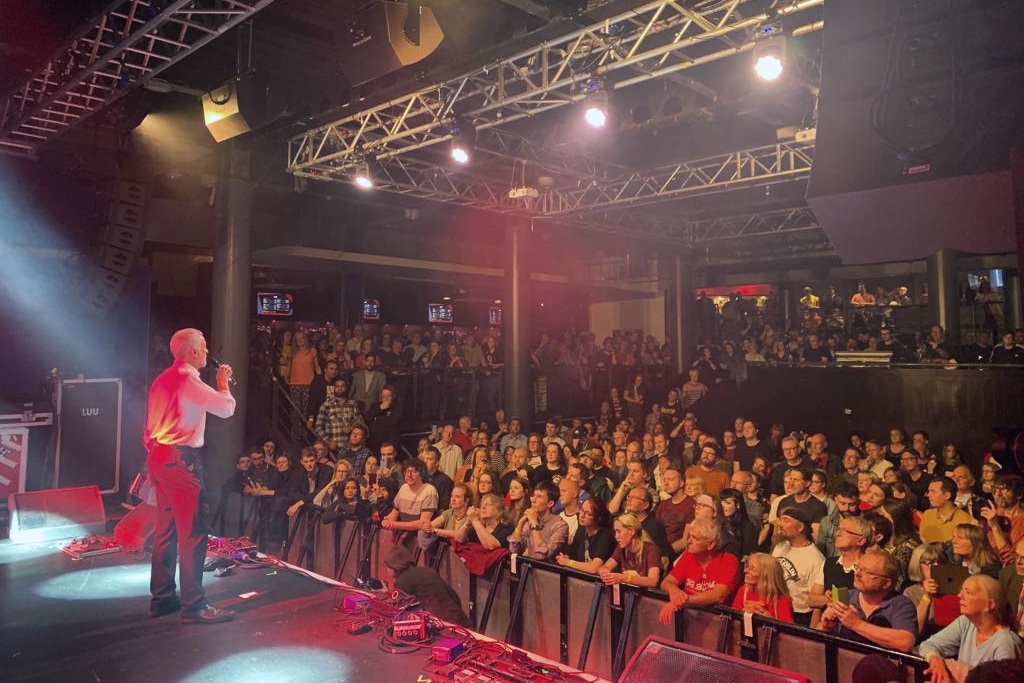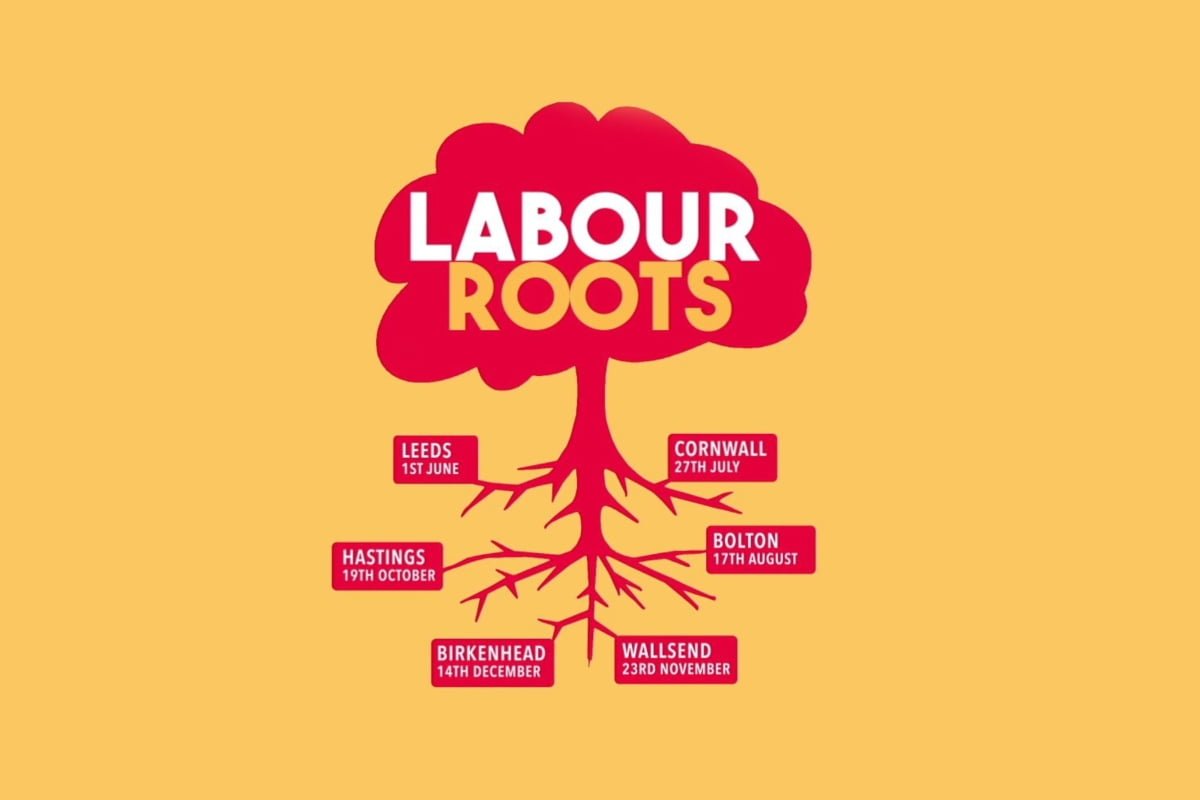The Labour Party leadership is touring the country in order to build enthusiasm and mobilise activists in advance of a general election. Last weekend’s launch event highlights the potential for our movement.
Last Saturday, the first of what will be a series of Labour Roots events took place in Leeds. The day was divided into three simultaneous meetings on different topics in different parts of the city, followed by an evening rally. The events are intended to produce greater connection between the shadow cabinet, party members, and local campaigning organisations.
At an event on in Pudsey on public service cuts, shadow education secretary Angela Rayner spoke alongside Jane Aitchison, PPC for the highly marginal constituency there, and local activists from Hands Off Our Homes and the FBU.
The meeting on fighting the far right, held in Harehills, was billed as a discussion between Diane Abbott and three anti-racist activists, chaired by the local MP and shadow justice secretary Richard Burgon. In the end, though, it was also attended by Jeremy Corbyn himself.
Finally, the meeting in central Leeds on the environment was chaired by local MP Fabian Hamilton, and featured Shadow International Development Secretary Barry Gardiner alongside representatives from Frack Free Leeds, Extinction Rebellion, and Youth Strike 4 Climate. Socialist Appeal supporters attended this event.
Green Industrial Revolution
The environment meeting began with speeches from each of the speakers. We heard about the work of Frack Free Leeds and the environmental danger fracking poses. We also heard a message from Extinction Rebellion (XR), which criticised Labour’s record on the environment. The XR representative outlined the urgency of the climate crisis, and demanded a response that goes beyond party politics while respecting grassroots activism.
Two young activists from Leeds Youth Strike 4 Climate sustained this criticism of Labour policy and restated the importance of grassroots work being respected and operating independent of party structures. They also began to indicate some of the ways climate change is connected to systemic problems and structural inequalities. Unfortunately, however, the ultimate responsibility of capitalism was left unspoken.
Finally, Barry Gardiner responded to the activists’ speeches, attempting to reassure them that Labour understood their concerns, talking about his own work on climate change over many years and outlining plans for a Green Industrial Revolution.
Though he is clearly not from a radical political tradition and did nothing to connect the topic to socialism, Gardiner managed to cut a somewhat different figure than much of the slick and craven careerists in the PLP by speaking with some passion and character.
The meeting was attended by perhaps 70-100 people, including many party activists. When the opportunity opened up for discussion, it initially seemed that it would be a stage-managed affair, with questions being selected from written submissions which attendees were invited to write on arriving. There was also less time for discussion than would be ideal.
In the end, however, the discussion became a fairly lively one, touching on questions such as the rival target dates for achieving carbon neutrality (2025 or 2050) and the position of trade unions in the Green Industrial Revolution.
Enthusiasm
In the evening, the main rally brought a party atmosphere to the day. Compered by Richard Burgon at a nightclub in the Leeds University Union building, the rally saw a series of addresses from each of the shadow cabinet members and other speakers. These varied in tone from Angela Rayner’s hype act to Corbyn’s policy-focused rhetoric.
In many respects, the event demonstrated the continued energy in Corbyn’s Labour Party, and the widespread enthusiasm that exists at the prospect of a socialist Labour government. It also illustrated the role Labour can play in amplifying important campaigns, bridging parliamentary politics with protest and struggle.
However, it also reveals some of the limits of the Corbyn movement as it stands. Firstly, it is worth noting the very mixed politics of the speakers. Some of these (including Corbyn) spoke very clearly about socialism and raised good demands about the abolition of tuition fees, ending austerity, and so on. But others drew no connections between their critiques and the need for socialist policies.
Labour can play a leading role in struggles over climate change and racism not just by taking cues from grassroots activists, but by presenting a serious socialist, working-class perspective on these questions.
Need for bold ideas
 Secondly, though the events were clearly intended to attract a broad audience and to generate an atmosphere of unity and celebration, there was a notable lack of new faces: it was more successful in galvanising existing activists than drawing new people in, as the Corbyn movement has in the past.
Secondly, though the events were clearly intended to attract a broad audience and to generate an atmosphere of unity and celebration, there was a notable lack of new faces: it was more successful in galvanising existing activists than drawing new people in, as the Corbyn movement has in the past.
This could in part be seen in the age of the attendees: it seemed that very few of the students who gave Corbyn such a memorable welcome with a mass rally in 2017 were reached by the Labour Roots event.
In turn, this is a product of the more managed nature of the event. Attendees had to register beforehand, and their names were checked on entry. There was a heavy police presence outside the rally, and a thorough security process. Inside the club, the shadow cabinet members even spent time in a cordoned VIP area.
Ironically, too, it seems that the initiative for the ‘Labour Roots’ events has come from the party leadership, with local groups only becoming aware of it a matter of weeks before. As the Corbyn movement strengthens its control of the party and becomes institutionalised, the danger of top-down management and diluted political demands is clear.
Labour Roots promises to be an exciting series of events giving Labour members and supporters an opportunity to rally around and challenge leading figures. However, it also makes clear the dangers ahead if the Labour leaders do not inspire and mobilise workers and youth with bold socialist ideas and grassroots organisation.






